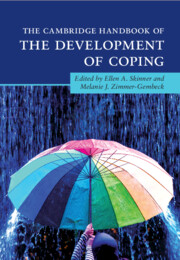Book contents
- The Cambridge Handbook of the Development of Coping
- Cambridge Handbooks in Psychology
- The Cambridge Handbook of the Development of Coping
- Copyright page
- Contents
- Contributors
- Preface
- 1 A Systems Perspective on the Development of Coping
- Part I Theoretical Perspectives on the Development of Coping
- Part II Methods for Studying the Development of Coping
- Part III Neurophysiological and Experiential Bases of the Development of Coping
- Part IV Psychological Foundations of the Development of Coping
- Part V Social Contexts and the Development of Coping
- 17 Coping Development as an Everyday Interpersonal Process
- 18 Parenting, Socialization of Emotion, and the Development of Coping
- 19 Temperament, Family Context, and the Development of Coping
- 20 Interparental Conflict, Parental Relationship Dissolution, and the Development of Children’s Coping
- 21 Autonomy, Self-Determination, and the Development of Coping in Adolescence
- 22 Peer Stressors and Peer Relationship Dynamics in the Development of Coping
- 23 Income, Income Inequality, Community, and the Development of Coping
- 24 Culture, Diversity, Context, and the Development of Coping
- Part VI Application and the Development of Coping
- Index
- References
18 - Parenting, Socialization of Emotion, and the Development of Coping
from Part V - Social Contexts and the Development of Coping
Published online by Cambridge University Press: 22 June 2023
- The Cambridge Handbook of the Development of Coping
- Cambridge Handbooks in Psychology
- The Cambridge Handbook of the Development of Coping
- Copyright page
- Contents
- Contributors
- Preface
- 1 A Systems Perspective on the Development of Coping
- Part I Theoretical Perspectives on the Development of Coping
- Part II Methods for Studying the Development of Coping
- Part III Neurophysiological and Experiential Bases of the Development of Coping
- Part IV Psychological Foundations of the Development of Coping
- Part V Social Contexts and the Development of Coping
- 17 Coping Development as an Everyday Interpersonal Process
- 18 Parenting, Socialization of Emotion, and the Development of Coping
- 19 Temperament, Family Context, and the Development of Coping
- 20 Interparental Conflict, Parental Relationship Dissolution, and the Development of Children’s Coping
- 21 Autonomy, Self-Determination, and the Development of Coping in Adolescence
- 22 Peer Stressors and Peer Relationship Dynamics in the Development of Coping
- 23 Income, Income Inequality, Community, and the Development of Coping
- 24 Culture, Diversity, Context, and the Development of Coping
- Part VI Application and the Development of Coping
- Index
- References
Summary
This chapter offers an overview of research on the socialization of coping and emotion-related regulation. We begin the review with our conceptualization of coping and regulation. We then provide an overview of research on the socialization of coping and regulation. Specifically, we cover the role of the quality of the parent–child relationship, parental disciplinary practices, and emotion-related socialization practices on children’s coping and emotion-related regulation. We next consider applications of this research to interventions. We conclude with a discussion of complexities in this research, with a particular focus on the cultural context, bidirectional/interactional relations, and methodological factors.
- Type
- Chapter
- Information
- The Cambridge Handbook of the Development of Coping , pp. 447 - 467Publisher: Cambridge University PressPrint publication year: 2023



